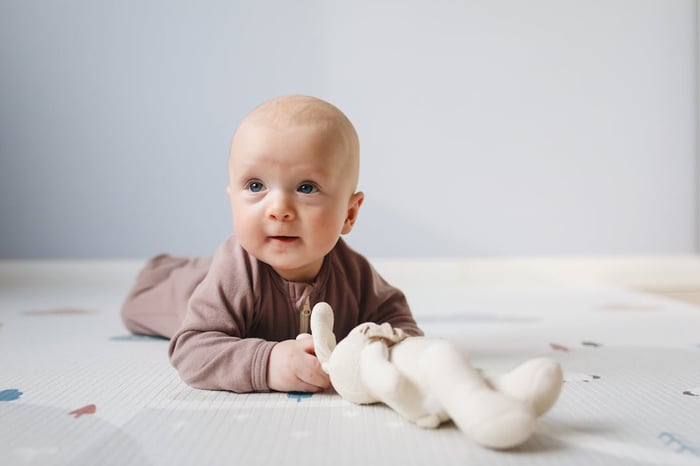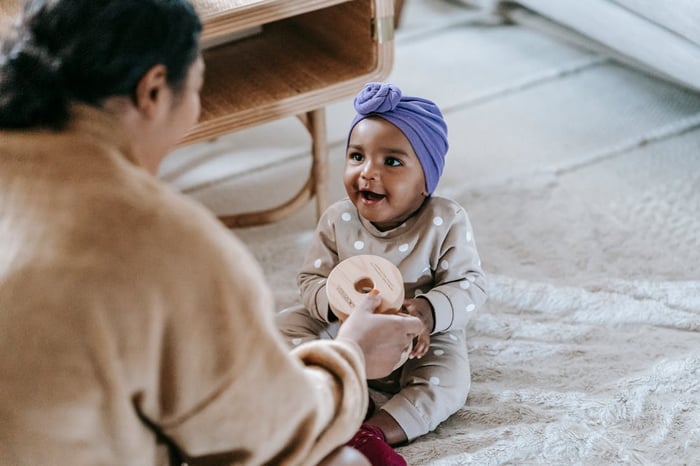Congratulations on becoming a parent! Watching your little one grow and develop is an incredible and sometimes nerve-wracking experience. One way to feel more confident and prepared is by understanding child development milestones.
These milestones are like checkpoints on your child's journey, showing you what skills they're likely to be developing at different ages. It's important to remember that every child develops at their own pace, so don't worry if your baby hits a milestone a little earlier or later than expected. But tracking milestones can help you identify potential delays and ensure your child is getting the support they need to thrive.
What Are The Child's Developmental Milestones?

Developmental milestones are the skills and abilities that most children develop at certain ages. They are a way to track your child's progress and make sure they are growing and learning as expected.
Think of your child's development as a four-legged stool – physical, cognitive, social & emotional, and communication. Each leg supports the others, and all are crucial for healthy growth.
There are four main areas of development, let's explore each one:
- Physical Milestones - development of gross, fine motor skills, and sensory development.
- Gross motor skills - these are the big movements the body makes using arms, legs, and torso, like crawling, walking, running, jumping, and climbing.
- Fine motor skills - these are the small movements made with hands and fingers, like picking up things, writing, tying shoes, and drawing.
- Sensory development - this is how senses use (seeing, hearing, touching, smelling, and tasting) to learn about the world around your baby.
Learn more about Baby Sensory Activities in the First 3 Months
- Cognitive Milestones - this includes things like problem-solving, memory, curiosity, and the ever-growing "why?" questions.
- Social and Emotional Milestones - ability to build friendships, understanding and expressing emotions, and playing with others.
- Communication Milestones - progression in language and speech, from those adorable first babbles to full-blown conversations, your child's voice is a treasure.
Why Does Tracking Developmental Milestones Matter?
![]()
Every precious moment with your newborn is a treasure. But beyond the cuddles and giggles, there's a hidden world of development unfolding. Tracking your baby's milestones isn't just about ticking boxes; it's about unlocking their full potential and ensuring they reach their bright future.
Did you know?
- 1 in 6 children aged 3-17 in the US has a developmental disability. (Source: CDC)
- Early intervention for developmental delays can improve outcomes by up to 70%. (Source: JAMA Pediatrics)
But how does tracking milestones help? Here are 4 ways:
1. Early Detection, Big Impact
Think of milestones as checkpoints on your baby's journey. Tracking them allows you to spot potential delays early, before they impact their learning and growth. This means quicker access to crucial interventions, like speech therapy or occupational therapy, setting your child on the path to success.
2. Know Your Baby, Inside Out
Milestones aren't just about "rolling over" or "babbling." They're a window into your baby's brain, revealing their strengths and areas needing a little extra support. Knowing your baby's unique path empowers you to tailor activities and interactions, nurturing their individual development.
3. Confident Decisions, Empowered Parenting
Monitoring milestones equips you with the knowledge to make informed choices about your baby's care and education. You'll be able to discuss concerns with doctors and educators with confidence, ensuring your baby receives the best possible support.
4. Building the Perfect Launchpad
Imagine your baby's future - a confident learner, a skilled communicator, a thriving individual. Tracking milestones helps you pave the way. By understanding your baby's current stage, you can provide the right activities and environment to nurture their skills, setting them up for success in school and beyond.
Developmental Milestones For Different Ages
Being a mom, you want the best for your little one. Seeing them grow and learn is a magical journey, but it can also be overwhelming. That's where understanding your baby's milestones comes in! This guide is your roadmap, breaks down your baby's development into 4 key areas, offering bite-sized info & tips to capture those precious moments .
Let's delve into what you can expect at key stages:
0-3 Months

- Physical - lifts head, kicks legs, tracks objects with eyes.
- Cognitive - responds to familiar voices and faces, reaches for objects.
- Social/Emotional - smiles, coos, shows excitement at being interacted with.
- Communication - makes vowel sounds, cries differently for different needs.
4-6 Months

- Physical - rolls over, sits with support, grasps objects firmly.
- Cognitive - starts to understand object permanence, enjoys sensory play.
- Social/Emotional - laughs, recognizes familiar people, reaches out to be picked up.
- Communication - babbles with different sounds, responds to their name.
7-9 Months

- Physical - sits unassisted, pulls to stand, transfers objects between hands.
- Cognitive - solves simple problems, shows curiosity about surroundings.
- Social/Emotional - shows stranger anxiety, enjoys playing peek-a-boo and other interactive games.
- Communication - says first words like "mama" or "dada", understands simple commands.
10-12 Months

- Physical - crawls, takes first steps, stands alone momentarily.
- Cognitive - uses objects purposefully (e.g., bangs drums), imitates gestures.
- Social/Emotional - plays simple games like patty-cake, shows affection towards caregivers.
- Communication - says several words, points to objects.
Remember, these are just general guidelines. Every child develops at their own pace. If you have any concerns about your baby's development, talk to your pediatrician.
Supporting Your Child's Development
 Now, the most critical question, how can you nurture your baby's remarkable progress?
Now, the most critical question, how can you nurture your baby's remarkable progress?
Here are some key tips:
- Talk, sing, and read to your baby regularly. Language exposure is crucial for early communication skills.
- Provide plenty of playtime with safe, age-appropriate toys. Encourage exploration and experimentation.
- Get down on the floor and interact with your baby. Face-to-face interaction and positive attention boost social and emotional development.
- Create a predictable routine. Consistent schedules provide a sense of security and support cognitive development.
And here's where Pixsee Play and Pixsee Friends comes in…
Pixsee Play helps you keep your little one safe and secure while he's in exploration mode. Watch his every move with its wide angle lens, and stay connected in real-time. You can even talk with him like if you had walkie-talkies!
Pixsee Friends is where the magic happens. They're soft toys that promote cognitive and emotional development in your baby. They each have a unique personality and can interact with Pixsee Play. Show your Pixsee Friend to Pixsee and it will play dedicated music!
They're the perfect care-and-play solution for both your little one and yourself.
By combining traditional nurturing techniques with the innovative capabilities of Pixsee Play and Pixsee Friends, you can create a truly enriching environment for your little one, fostering their development while filling your days with precious moments of connection and joy.
So, relax, cuddle your little one, and embrace the amazing journey of watching them blossom. Visit Pixsee Shop or Amazon online store now!







